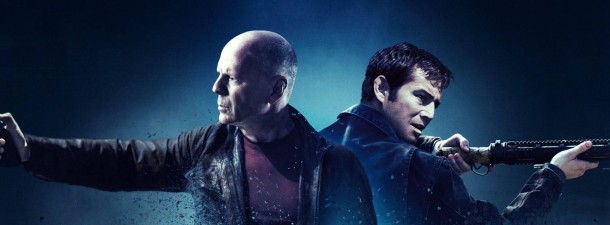Movie Review: ‘Looper’
October 5, 2012
Time travel movies that aren’t comedies tend to have some series issues when it comes to the whole interaction with the events making up the plot, alongside the general challenge of making sci-fi movies anything more than a nerdish wet dream. Enter “Looper,” a sci-fi film with a time travel plot and isn’t a comedy that also looks to involve telekinesis. My mind was already preparing the laundry list of mistakes I was likely to see and how I could make jokes out of the “Looper” title.
The only saving graces I thought would come were from the leading actor, Joseph Gordon Levitt, in prosthetic makeup to look like the supporting leading actor, the American action hero himself, Mr. Bruce Willis.
Bless my stars and garters, as “Looper” turned out to not only be a quality time travel story, but a sci-fi spaghetti western flick in a dystopian future with fairly good reasoning for most of the action.
The plot brings forward a marvelous conversation I’ve gotten to have in bars, classrooms, and with random folks:
“You find yourself back in time, and a young boy is playing in a yard. This young boy, who has done no great wrong yet, will one day grow up to become the monster of the 20th century known as Adolph Hitler. So, moral conundrum, do you kill him now, to save millions of lives later?”
In “Looper,” the question becomes more convoluted as the potential protector and potential killer of the possible “Hitler” is the same man at different times in his life. Both with their own highly personal reason further challenging their morals.
The time travel plot is not the focus of the movie, but only a mechanism to keep things flowing. The few legitimately good time travel movies all use time travel itself only as a backdrop, and “Looper” went a step further with making the act of time travel out to be less of a focus.
The whole film keeps the audience engaged and excited as Willis delivers his typical cool-under-fire gunplay performance while Levitt turns an impressive performance of Willis’ mannerisms without coming across merely as an imitation. To add to it, there is a mother and a child trapped in the crossfire, which makes the heartache a little more significant.
Jeff Daniels makes a cameo as a cool mob boss seemingly so disconnected from enjoying the better things in life, that his only enjoyment is trying to be a bad guy. While Emily Blunt plays the lost-to-life mother living only to protect the child she almost abandoned.
But, like any film, “Looper” has flaws. Knowing time travel is involved makes everyone in the audience ask themselves who or what is this character’s relevance? Why would this scene be here, unless it is really important? The telekinesis mechanic is a little too obvious. There is a realization that hits you about 45 minutes into the movie that is almost as obviously telling as the scene from “Hunt for Red October” with the cook.
There are a couple moments that could trick you into not being 99 percent certain of the M. Night Shamalyan-esque twist coming, but those aren’t given more than a minute or two before being washed away.
The twist isn’t bad, and the most of the logic problems with time travel and “why didn’t X just happen” hardly breach the forefront of your mind due to how engaging the movie is. The ending even leaves a little room for interpretation, which is a trait nearly all the good sci-fi movies have.
I recommend everyone goes to see “Looper” in the theaters. It is a great movie for a date or with friends and family. I’ll be owning this movie and would be happy to sit back on a lazy afternoon to watch it again while recovering from a hangover. My regular bias for noir crime films isn’t even a factor of why I recommend this movie — though if you like noir, to tempt you further, “Looper” is by the same director, Rian Johnson, who brought you the excellent noir crime movie “Brick“; which also starred Levitt.
And here is my interpretation of the ending, so, SPOILER ALERT:
When Levitt offs himself at the end in order to save the child from Willis, he is isn’t closing a loop. He is creating the time line that allows for the notorious Rainmaker. Note the mention of the rumor about the Rainmaker’s jaw and the child’s obvious dislike that would be for vagrants. The kid was already leagues ahead cognitively, so making the leap that he realizes when he is older how vital it is to ensure his life to eliminate loopers from the time continuum; hence the closing of Levitt’s loop last. That said, I also think the child is Levitt/Willis, based on the scene of his hair being lightly touched when Levitt was with the prostitute at the beginning and talked about his mother, combined with how Blunt does the same to his hair and the child’s during the movie. Which does make the sex scene a whole lot stranger, given the out-of-time incestuousness.
I’ll be watching the movie again just to try and create a better foundation for my who-is-really-who conclusions, but much like some of my other favorite movies with interpretive-twist endings that I’ve spent hours over pints in pubs discussing with my mates, I’m betting my explanation is fairly sound.
For a bonus treat, here is a list of some interpretive-twist movies I adore that you also won’t regret having seen: “Inception,” “Brazil,” “The Usual Suspects,” “American Psycho,” “Donnie Darko,” “Memento,” “Lost Highway,” “Twelve Monkeys,” “Mulholland Dr.,” “Primer,” “Run Lola Run,” “Time Bandits” and “Blade Runner.”
Happy viewing.







